Each and every programming language in nowadays’s international has the idea that of variables. Variables are used to retailer values (quantity, string, boolean) that may exchange at any cut-off date. However, did you ever understand that those variables all the time have a scope, and you’ll be able to’t use them outdoor of that scope? On this educational, you are going to discover the Scope of Variables in JavaScript.
Figuring out Variables in JavaScript
Variables in JavaScript paintings another way from different languages. Right here, you wouldn’t have to specify the kind of variable you’re the use of. In contrast to different programming languages, you wouldn’t have other information varieties for various kinds of values.
- You’ll use var, const, and let key phrase to claim a variable, and JavaScript will routinely decide the kind of this variable consistent with the price handed.

So, this used to be a temporary creation to Variables in JavaScript. Within the subsequent segment, you are going to move during the Scope of Variables in JavaScript.
What’s the Scope of Variables in Javascript?
Scope of variables refers back to the accessibility of a specific variable throughout the program.
As an example, think you will have two other purposes. First, you claim a variable in serve as 1. Then, you progress directly to the next serve as, i.e., serve as 2. Is it conceivable in the event you attempt to get admission to the variable made in serve as 1 from serve as 2? This refers back to the Scope of a Variable in JavaScript.
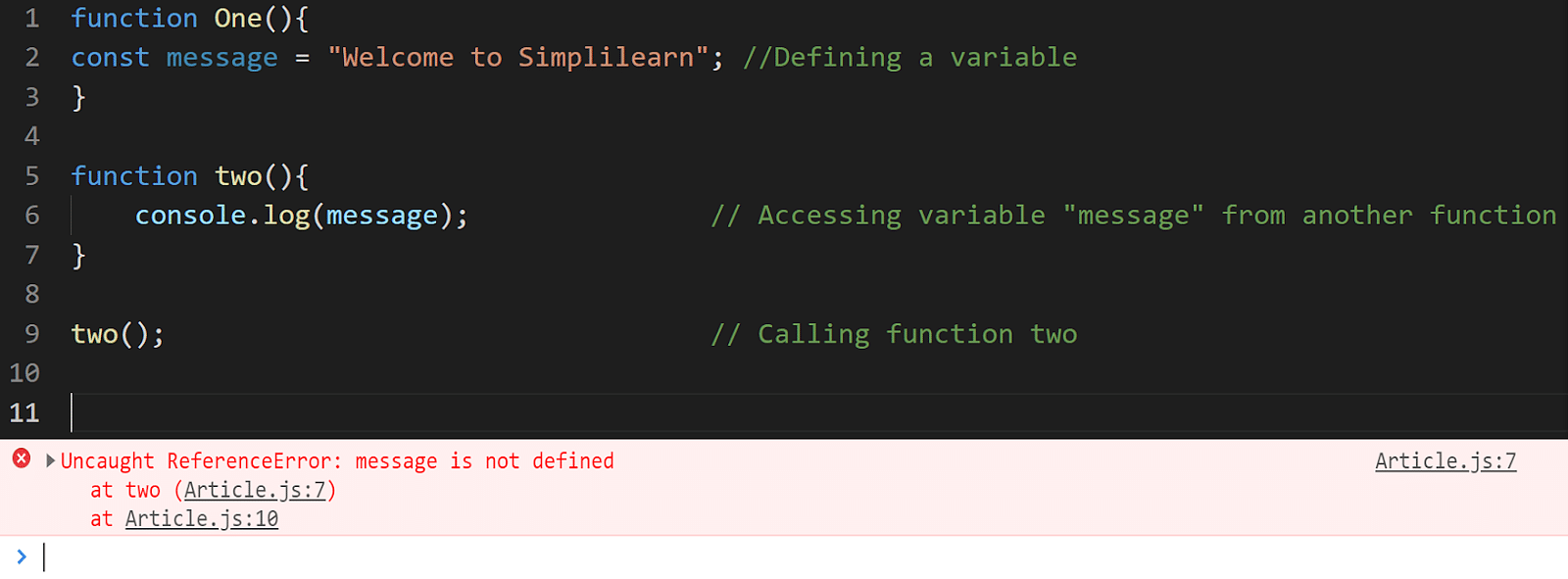
JavaScript variables have other scopes, they’re:
- International Scope
- Native Scope
- Block Scope
- Serve as Scope
Take a look on the other Scopes intimately.
What’s International Scope?
- Any variable declared outdoor of a serve as is alleged to have International Scope.
- In easy phrases, a variable that may be accessed anyplace in this system is referred to as a variable with world scope. Globally scoped variables can also be outlined the use of any of the 3 key phrases: let, const, and var.
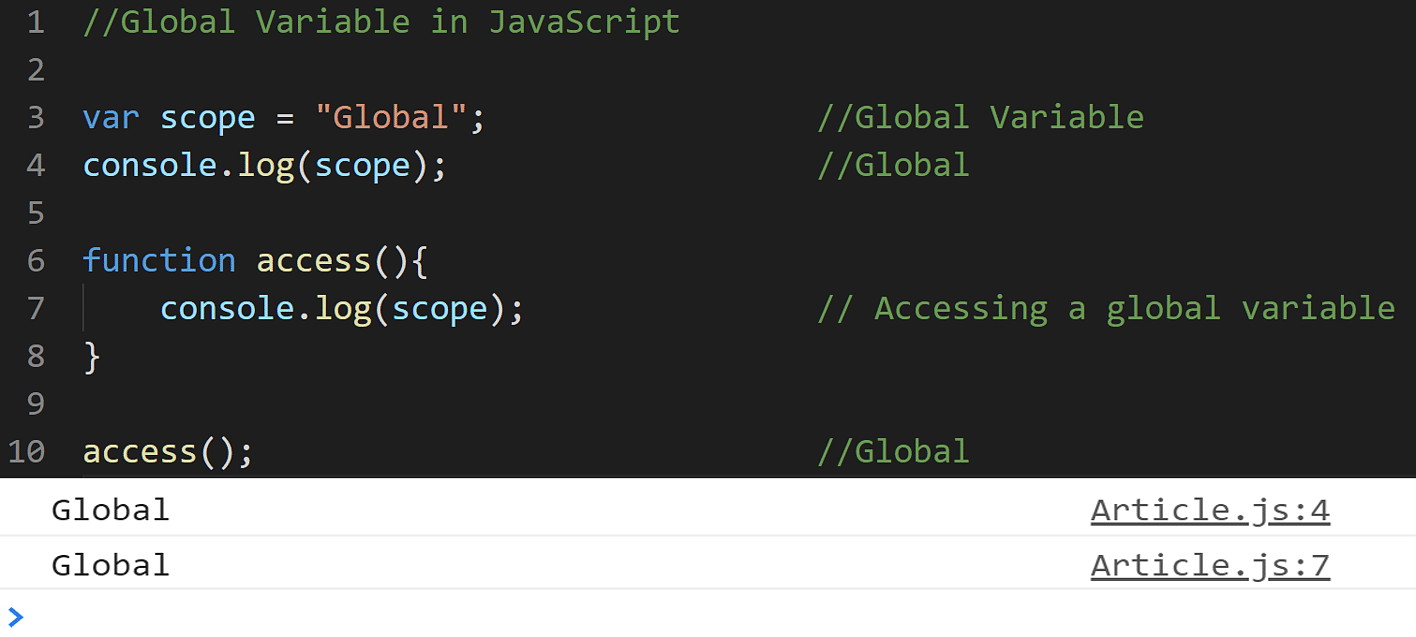
What’s Native Scope?
- Any variable that you just claim inside of a serve as is alleged to have Native Scope. You’ll get admission to a neighborhood variable can inside of a serve as. In the event you attempt to get admission to any variable outlined inside of a serve as from outdoor or every other serve as, it throws an error.
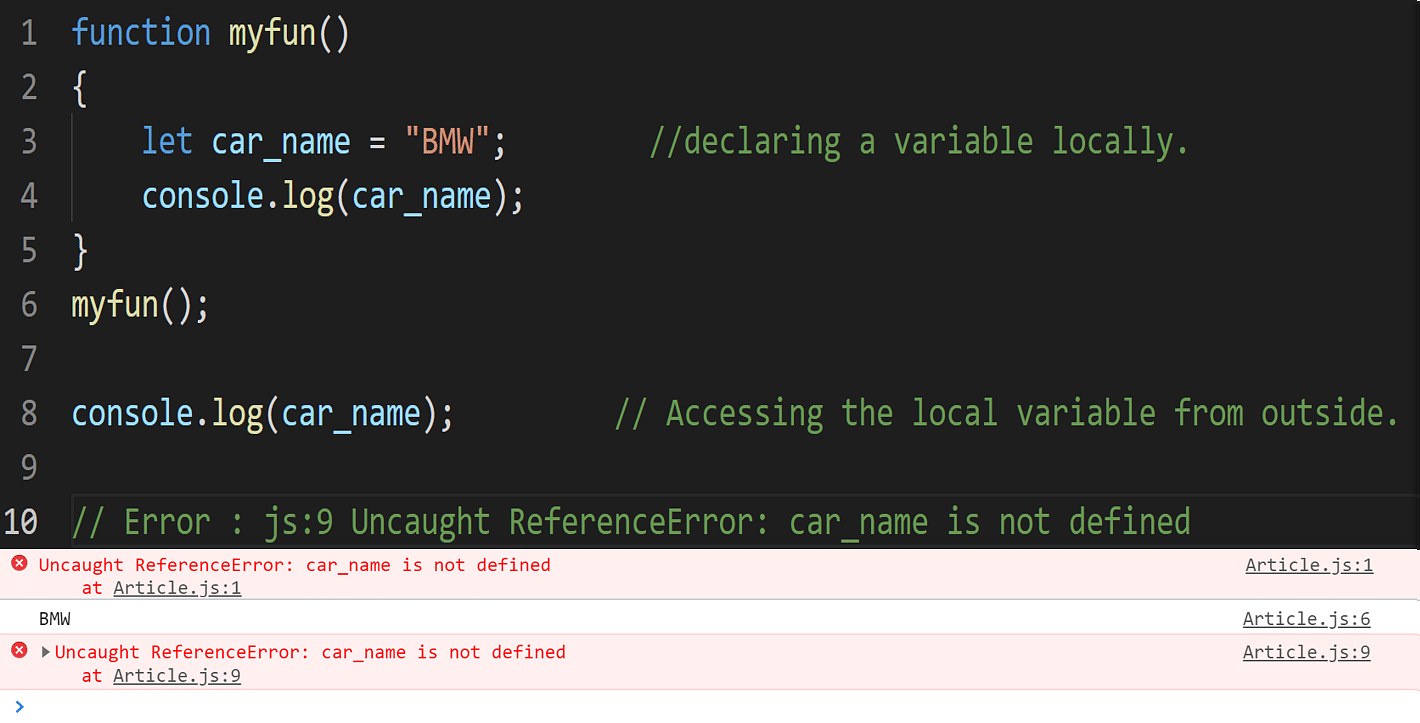
- Since you can’t get admission to a neighborhood variable from outdoor the serve as, you’ll be able to have a variable of the similar title in every other serve as as properly.
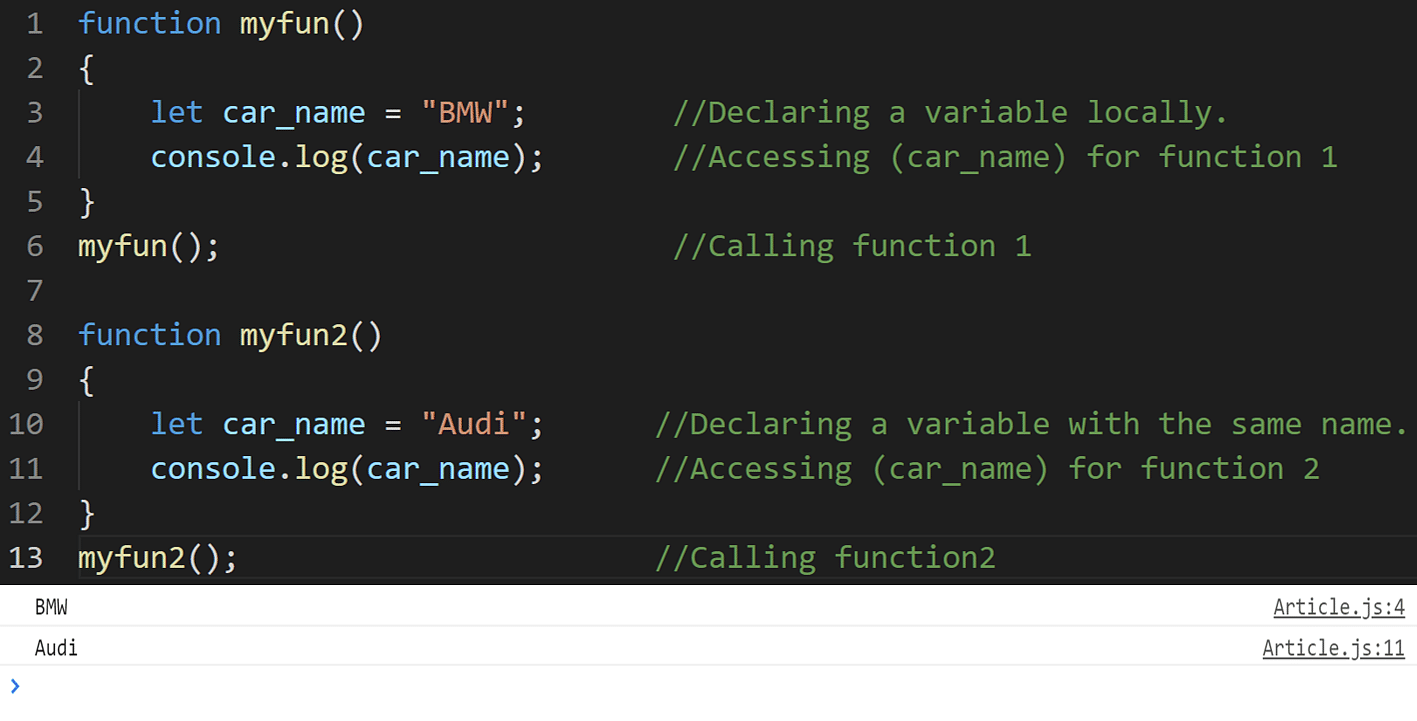
What’s Block Scope?
- Ahead of introducing ES6 (ECMAScript 6) in 2015, JavaScript had handiest two forms of scopes: International Scope and Native Scope.
- With the creation of let and const key phrases, it added a brand new form of Scope in JavaScript. You can not get admission to the variables declared inside of a specific block (represented by way of {}) from outdoor the block.
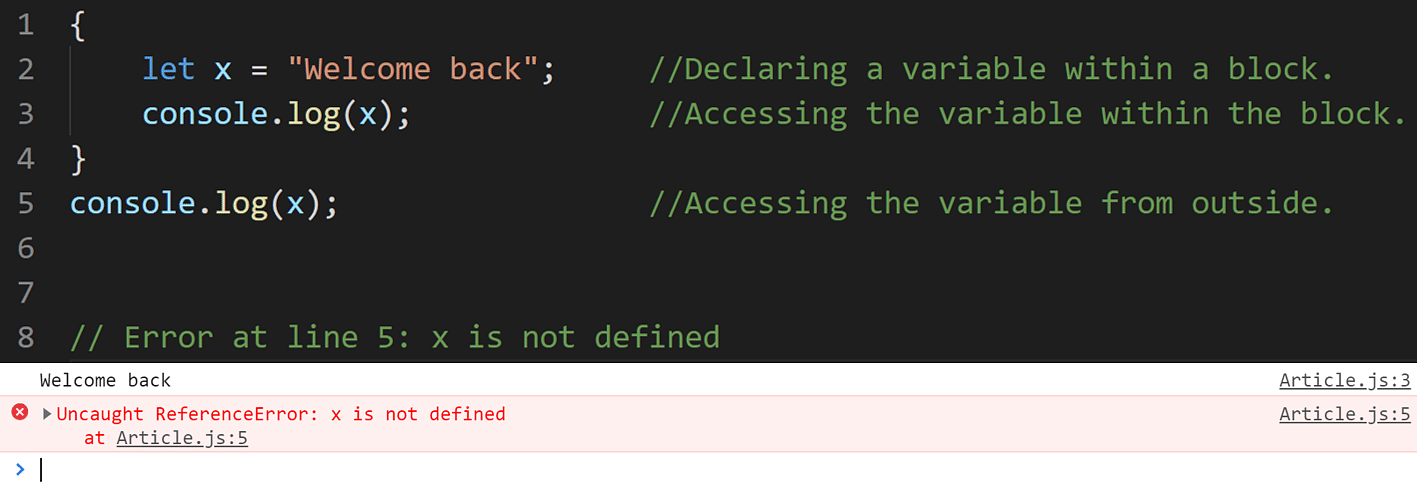
- The block scope does now not paintings with the var key phrase. You’ll both use let or const key phrases for that.
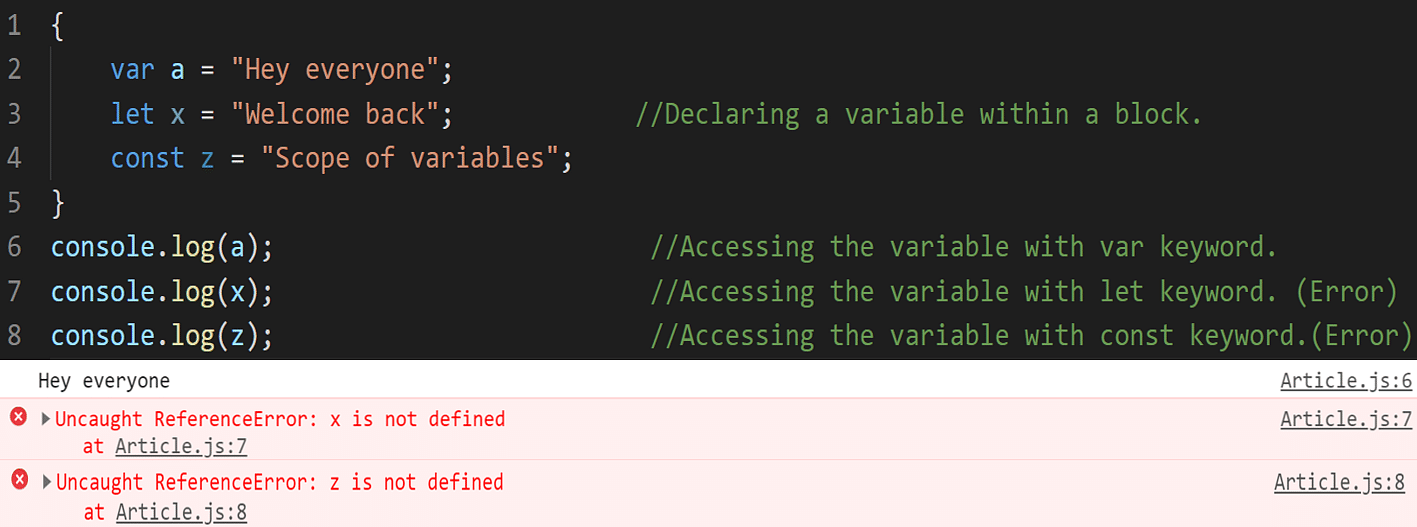
What’s Serve as Scope?
- With the introduction of every new serve as, it creates a brand new scope in JavaScript. You can not get admission to variables outlined inside of a serve as from outdoor the serve as or from every other serve as. Var, let, and const paintings in a similar fashion when used inside of a serve as.
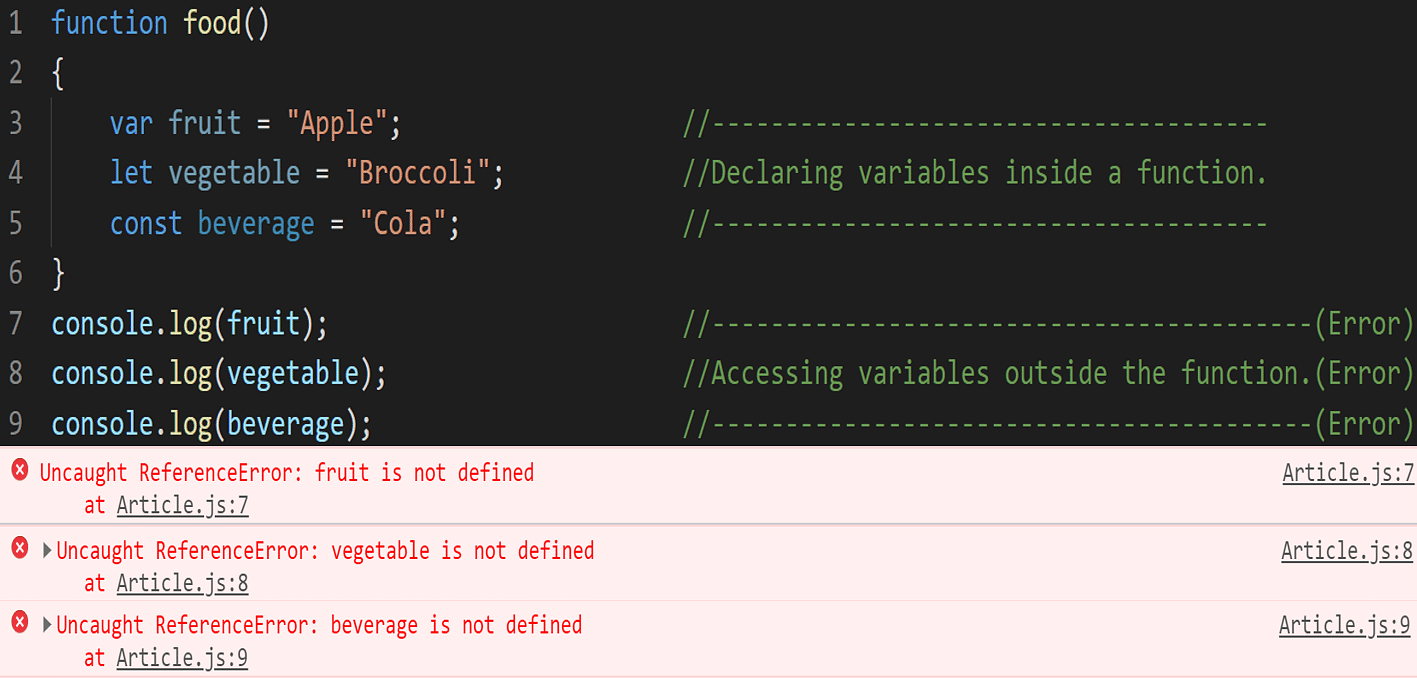
JavaScript Strict Mode for Defining Scope of a Variable
In JavaScript, in the event you put out of your mind to claim a variable with a key phrase: var, let, and const, JavaScript routinely takes it as an international variable, and you’ll be able to get admission to it anyplace in this system.

To keep away from such errors and confusion, the stern mode used to be offered in JavaScript with ES5 (ECMAScript 5) within the 12 months 2009.
- Strict mode will throw an error in the event you attempt to use the similar syntax after together with “strict mode” for your program. It’s going to mean you can in writing cleaner and extra protected code.

- Identical to variables, strict mode too can be utilized both globally or in the neighborhood. In the event you write “use strict” on the program’s get started, it is going to be used globally. Differently, you’ll be able to additionally use strict mode in the neighborhood inside of a serve as.
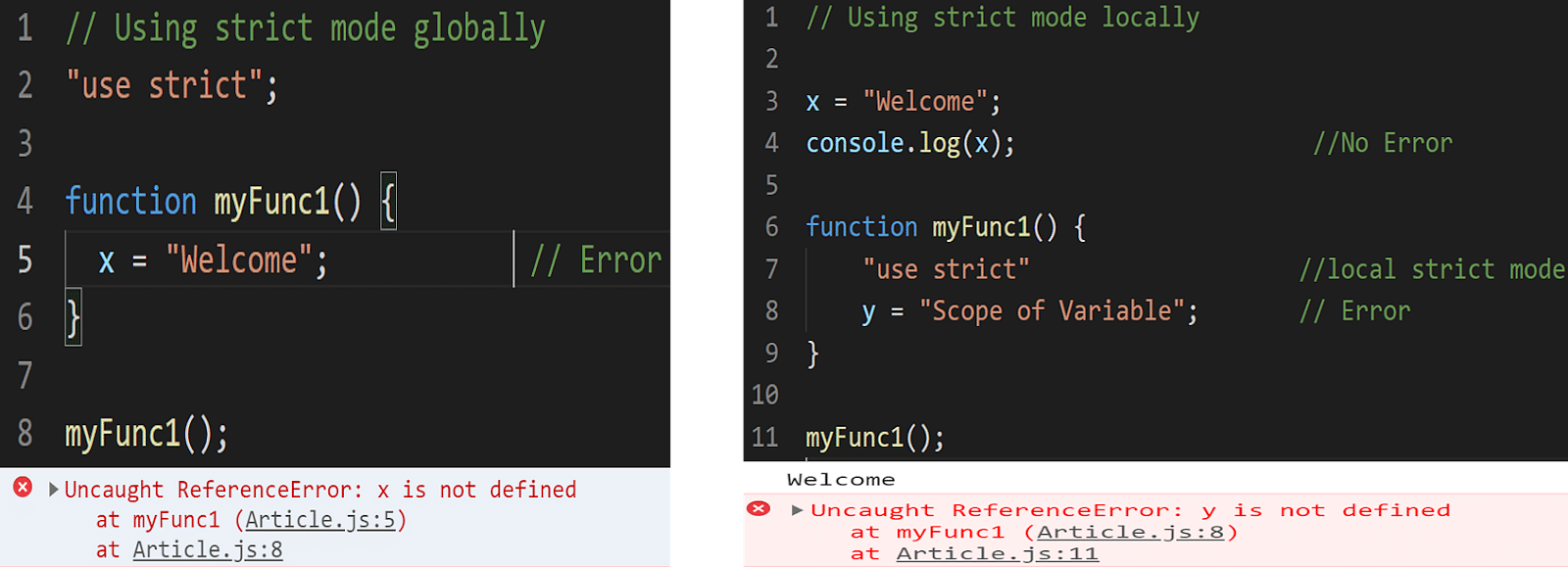
- The entire fashionable browsers improve Strict mode, aside from web explorer 9 and its earlier variations.

Lifetime of a Variable in JavaScript
Scope Best possible Practices
Scope best possible practices are crucial pointers for writing blank, environment friendly, and maintainable code in JavaScript. By way of adhering to those practices, builders can decrease attainable problems associated with variable conflicts, enhance code clarity, and improve general code high quality. Beneath are some key scope best possible practices to imagine:
Use Native Scope Each time Imaginable
- Restrict using world variables and attempt to claim variables throughout the narrowest scope conceivable.
- Encapsulate variables inside of purposes on every occasion possible, as native variables are handiest available throughout the serve as the place they’re declared, lowering the danger of accidental unintended effects and conflicts.
Steer clear of International Variables
- Decrease using world variables to forestall variable air pollution and attainable conflicts with different portions of the codebase.
- When world variables are important, imagine encapsulating similar capability inside of a unmarried world object to forestall namespace collisions and enhance code group.
Steer clear of Enhancing Variables in Outer Scopes
- Be wary when editing variables declared in outer scopes from inside of nested purposes.
- As an alternative of depending on variables from outer scopes, cross important values as arguments to purposes or use closure to encapsulate variables inside of a serve as’s lexical scope.
Use Block Scope with let and const
- Embody block scope offered in ES6 the use of let and const key phrases for variable declaration inside of block statements (e.g., if, for, whilst).
- In contrast to var, let and const have block scope, which means they’re handiest available throughout the block the place they’re outlined, lowering the danger of unintended variable hoisting and bettering code predictability.
Steer clear of Variable Hoisting Pitfalls
- Take note of variable hoisting, a conduct in JavaScript the place variable declarations are moved to the highest in their containing scope all through the compilation section.
- To keep away from confusion and attainable insects, claim variables originally in their scope and assign values later within the code.
Decrease Dependency on International State
- Scale back dependencies on an international state by way of the use of dependency injection or modular design patterns to regulate shared states and conversation between other utility portions.
- This is helping decoupled modules, enhance testability, and make code extra modular and reusable.
Use Strict Mode
Allow strict mode (“use strict”) originally of JavaScript recordsdata or purposes to implement stricter parsing and mistake dealing with. This may increasingly assist catch not unusual programming errors and advertise cleaner code practices.
Significance of Minimizing International Variables
Minimizing world variables is a elementary idea in fashionable JavaScript building, the most important for writing blank, maintainable, and scalable code. International variables confer with variables declared outdoor of any serve as or block, making them available from anyplace within the codebase. Whilst world variables would possibly appear handy, over the top reliance on them may end up in a number of problems, underscoring the significance of minimizing their utilization.
Combating Variable Air pollution
- International variables introduce the danger of variable air pollution, the place other portions of the codebase accidentally alter or overwrite world variables.
- This may end up in conflicts, sudden conduct, and difficult-to-debug problems, particularly in massive and complicated codebases with a couple of builders contributing code.
Encouraging Modularity and Encapsulation
- Minimizing world variables encourages modular design and encapsulation, the place capability is encapsulated inside of modules or purposes with restricted scope.
- This promotes code group, reusability, and maintainability, as modules can also be evolved, examined, and changed independently with out impacting different utility portions.
Making improvements to Code Clarity and Maintainability
- Over the top world variables could make code extra advanced to grasp and take care of, as builders should observe the state and dependencies of variables during all of the codebase.
- Proscribing the scope of variables to the place they’re wanted makes code extra self-contained, predictable, and more uncomplicated to explanation why about, resulting in stepped forward clarity and maintainability.
Decreasing Dependency on International State
- International variables introduce a shared state that may be changed by way of any utility section, resulting in tight coupling between other parts and modules.
- Minimizing world variables reduces dependency at the world state, making it more uncomplicated to regulate the appliance state, isolate issues, and put in force options with out accidental unintended effects.
Improving Testability and Debugging
- Code that is based closely on world variables can also be difficult to check and debug, as it’s going to require in depth setup and mocking of the worldwide state.
- By way of minimizing world variables and the use of dependency injection or module imports as a substitute, code turns into extra modular and testable, facilitating unit checking out and more uncomplicated debugging.
Selling Efficiency and Optimizations
- Over the top world variables can obstruct functionality optimizations, because the JavaScript engine would possibly wish to allocate further assets to regulate the worldwide state.
- Minimizing world variables may end up in extra environment friendly code execution and lowered reminiscence intake, particularly in performance-sensitive programs.
Use of Suitable Variable Names for Readability
Opting for suitable variable names is foundational to writing transparent and comprehensible code in any programming language, together with JavaScript. Efficient variable naming now not handiest aids within the comprehension of code by way of builders but additionally contributes to its maintainability, scalability, and general high quality. Here is a detailed exploration of the significance of the use of suitable variable names for readability:
Improving Code Clarity
- Descriptive variable names considerably enhance the clarity of code by way of offering significant context and conveying the aim of the variables.
- Self-explanatory names make it more uncomplicated for builders to grasp the code’s capability with out the will for in depth feedback or documentation.
Facilitating Code Repairs
- When revisiting or keeping up code, well-chosen variable names simplify comprehending the common sense and intent at the back of every variable.
- Renaming or editing variables turns into much less error-prone and extra environment friendly when the names appropriately mirror the knowledge they constitute or their position within the code.
Selling Code Reusability
- Suitable variable names inspire the introduction of modular and reusable code by way of obviously indicating the aim and scope of variables.
- When variable names appropriately put across their meant utilization, builders can extra simply establish alternatives to refactor or extract not unusual capability into reusable parts.
Making improvements to Collaboration and Code Sharing
- Transparent and significant variable names facilitate collaboration amongst staff contributors by way of offering a not unusual working out of the codebase.
- When sharing code with others or contributing to open-source initiatives, descriptive variable names make it more uncomplicated for exterior builders to realize and give a contribution to the code.
Combating Misinterpretation and Insects
- Ambiguous or deceptive variable names may end up in misinterpretation of code and introduce insects or logical mistakes.
- The usage of exact and descriptive names reduces the danger of confusion and is helping make sure that variables appropriately constitute the knowledge or capability they encapsulate.
Adhering to Coding Requirements and Best possible Practices
- Constantly the use of suitable variable names adheres to coding requirements and best possible practices, selling a uniform and maintainable codebase.
- Setting up naming conventions inside of a challenge or group fosters consistency and streamlines code critiques and upkeep duties.
Encouraging Self-Documentation
- Significant variable names act as a type of self-documentation, lowering the will for over the top feedback or documentation throughout the code.
- Builders can briefly grab the aim and behaviour of variables by way of merely studying their names, resulting in extra environment friendly code comprehension and troubleshooting.
When to Use Other Sorts of Scope
Figuring out when to make use of various kinds of scope in JavaScript is the most important for writing environment friendly and maintainable code. JavaScript gives quite a lot of forms of scope, together with world scope, serve as scope, and block scope, every serving distinct functions. Here is a information on when to make use of every form of scope:
International Scope
- When to Use: Use world scope for variables and purposes that wish to be available from anyplace throughout the codebase.
- Instance Use Circumstances:
- Constants or configuration variables which can be used during the appliance.
- Software purposes or libraries that supply usual capability throughout other modules or parts.
- Concerns: Be wary when the use of world scope to keep away from polluting the worldwide namespace and attainable conflicts with different portions of the codebase.
Serve as Scope
- When to Use: Use serve as scope for variables and purposes handiest wanted inside of a selected serve as.
- Instance Use Circumstances:
- Brief variables used for calculations or intermediate effects inside of a serve as.
- Helper purposes or callbacks which can be handiest related to a specific serve as’s execution context.
- Concerns: Variables declared inside of a serve as don’t seem to be available outdoor that serve as, selling encapsulation and combating accidental unintended effects.
Block Scope (Offered with let and const)
- When to Use: Use block scope for variables which can be restricted in scope to a selected block of code, such as though statements, for loops, or whilst loops.
- Instance Use Circumstances:
- Loop counters or iterators which can be handiest related inside of a loop.
- Brief variables are used for conditionally executing code blocks.
- Concerns: Block-scoped variables are handiest available throughout the block the place they’re declared, offering tighter keep an eye on over variable visibility and lifelong.
Lexical Scope
- When to Use: Lexical scope is inherent in JavaScript and is routinely implemented in accordance with the bodily placement of code throughout the supply document.
- Instance Use Circumstances:
- Variables declared in outer scopes are available to nested purposes, bearing in mind closures and keeping up get admission to to variables even after the outer serve as has returned.
- Concerns: Lexical scope permits robust programming patterns corresponding to closures, which is able to encapsulate state and create modular and reusable code.
Conclusion
On this educational, you explored The Scope of Variables in JavaScript. The Scope is dependent upon two sides:
- The place the variable declared
- How the variable declared
You additionally went during the want and utilization of “strict mode” in JavaScript. Following this, you additionally understood how lengthy a variable can be provide for you whilst programming. You additionally encountered the coding implementation and wish to perceive the Scope of a Variable found in JavaScript.
Are you curious about increasing your wisdom of JavaScript or are searching for on-line coaching in JavaScript programming?
If the solution is sure to both or each the above questions, the Complete Stack Developer – MERN Stack direction presented by way of Simplilearn is one thing you will have to discover. This implemented coaching program is designed that can assist you grab the ideas of JavaScript from fundamentals to complex ranges along side different ideas associated with MongoDB, Categorical.js, React, and Node.js (“MERN”), plus GIT, HTML, and CSS.
On that word, you probably have any doubts associated with this educational on Scope of Variables in JavaScript, do not hesitate to put them as feedback on the finish of this web page; we will be able to reply to them quickly!












